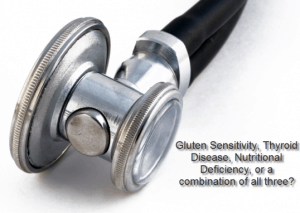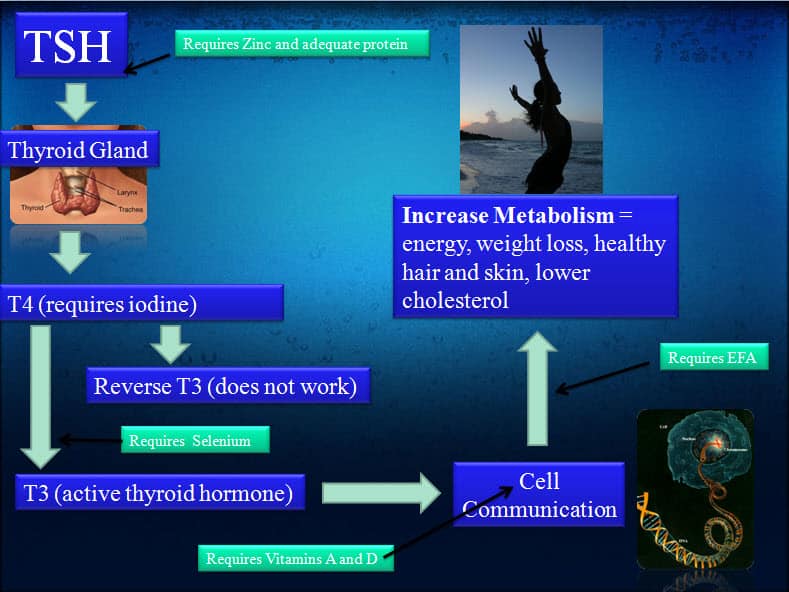No products in the cart.
 More and more doctors are looking toward diet as a contributing factor in thyroid diseases. A new study sheds light on the fact that selenium deficiency can be caused by gluten induced malabsorption. The researchers go on to say that Selenium deficiency can cause thyroid diseases and can lead to unregulated inflammatory damage…
More and more doctors are looking toward diet as a contributing factor in thyroid diseases. A new study sheds light on the fact that selenium deficiency can be caused by gluten induced malabsorption. The researchers go on to say that Selenium deficiency can cause thyroid diseases and can lead to unregulated inflammatory damage…
Regarding gluten sensitivity –
the target organs are not limited to the gut, but include thyroid, liver, skin and reproductive and nervous systems…
Regarding selenium deficiency –
Thus, selenium malabsorption in CD (celiac disease) can be thought as a key factor directly leading to thyroid and intestinal damage.
Source:
Ann Ist Super Sanita. 2010;46(4):389-399.

It is no medical mystery that gluten can cause vitamin and mineral deficiencies. Selenium is a mineral with multiple functions within the body. A short list of some of selenium’s more common roles is listed below:
- It plays a role in the production of active thyroid hormone (see chart below).
- It is a powerful anti-inflammatory and helps to regulate immune function.
- It plays a role in blood viscosity (reduces excessive clotting of the blood).
- It drives the most powerful antioxidant system in the body.
This study points out that no only does gluten induced selenium deficiency cause abnormal thyroid hormone production, it leads to excessive inflammation and autoimmune disease.
In previous posts we have discussed how going on a gluten free diet can lead to fat loss. One of the reasons this happens for many is that a gluten free diet helps the thyroid gland start working again. This in turn increases the metabolism.

Other Nutrients Important for Thyroid Function –
- Iodine – this mineral helps the body build T4 (the hormone that doctors commonly measure that floats through the bloodstream)
- Vitamins D and A – these fat soluble vitamins allow T3 (the active hormone) to communicate with your DNA and increase your metabolism.
- Zinc & Magnesium – these minerals help your body make TSH (the hormone made in your brain that tells your thyroid gland to make T4).
- Protein – most Americans eat too many carbs and not enough protein. Protein is absolutely necessary to form the backbone of thyroid hormone. It also carries the hormone through the blood stream to your tissues.
What Can You Do If You Have Been Diagnosed with Hypothyroidism?
Have your doctor perform the following tests –
- Iodine loading test (urine test)
- Spectracell (vitamin and mineral deficiency blood test)
- Reverse T3 and thyroid antibody testing
- Genetic testing for gluten sensitivity
It is time for doctors to start ruling out gluten sensitivity, celiac disease, and nutritional deficiencies in patients with thyroid disease. If your doctor will not investigate these areas for you, look for a functional medicine doctor who will.
If you think that this information will help someone you love suffering with a thyroid problem, please forward this along.
My thyroid is still getting worse after a year on a grain free diet. It is so frustrating!
Have you looked to identify nutritional deficiencies and other food or environmental allergens?
Funny, I have had Rheumatoid Arthritis since age 3, and recently tested a bit low in T3, progesterone and AM cortisol. I also had testing done through Spectracell and was deficient in selenium, among other things (magnesium, zinc, vitamins A, D, K, C, most B complex, choline, asparagine, antioxidants, glucose-insulin interaction, etc.). I’ve also had HLA DQ2/DQ8 testing done through LabCorp, but it came back negative, as well as the thyroid antibodies test for Hashimoto’s. My mom is also hypothyroid, has gastro issues, and occasionally a rash that closely resembles dermatitis herpetiformis on her arms and neck…
What am I missing to determine a true gluten sensitivity? I’ve gone grain-free for significant lengths of time, but still seem to have low-grade inflammation in certain joints…Besides a sugar-free and grain-free diet, what can I do to balance my hormones and put my RA into remission for good?
JL,
Your HLA-DQ testing needs to be looked at for genes other than DQ2 and 8. Most doctors are not aware of the genetic relationship with non-celiac gluten sensitivity. You should also look at having a food and environmental allergy test performed. Other foods can trigger and contribute to autoimmune disease.
All the best,
Dr. O
JL,
I’m curious about this. My problems are more along the lines of fatigue, but I started a high-fat diet, which meant eating lots of beef suet. It made a pretty huge difference along with grain free and mostly sugar free diet. my email is cloudffvii88@gmail.com if you want to write back and tell me what happens. Good luck, -Charlie
why won’t most doctors and endo’s check all thyroid hormones other than TSH? I went undiagnosed for 2 years with severe hypo symptoms but because my TSH was in the normal range I was told I was not hypo until a doc. checked my free T3. Now that I’m on armour I’m much much better. I’m going to go gluten free now too to see if it helps.
Dear Dr. Osborne,
My daughter has polycystic ovaries and is not ovulating. Both my husband and I have tested positive and now are on the diet for gluten sensitivity. Could the gluten be the cause of her ovaries not working? She needs some hope.
Gluten sensitivity is commonly associate with PCOS. Have your daughter watch the following video:
https://stg-gfsociety-oldgfs.kinsta.cloud/video-tutorial/gluten-sensitivity-what-is-it/
My 19 yr old daughter has Celiac and several food intolerances. She is very thin and had been having hair loss. Her Thyroid tests a yr ago were normal. I asked the doctor to run her tests again and her Free T3 was low. She is now on a low dose of Armour. Her hair stopped falling out and she said her brain didn’t feel foggy anymore. Unfortunately, she has lost a few pounds since she has been on her thyroid medications. Trying to figure out how to help her gain weight without most grains, dairy, eggs, soy, and beef.
Ask your doctor to perform an iodine loading test. Iodine is a mineral that is essential for the body to produce thyroid hormone. Additionally, have the doctor perform a spectracell vitamin and mineral analysis (blood test).
Lack of nutrients can contribute to weight gain issues.
Can gluten-intolerance also lead to hypER thyroid issues? I had hyperthyroidism that was out of control just a few weeks after having my appendix out, which I believe now was connected to a gluten-intolerance I didn’t know I had at the time. in order to correct the hyperthyroidism, they gave me radioactive iodine, which now means I am hypothyroid, but luckily that can be controlled, for the most part with synthetic hormone replacement.
This is for Susan, June 16 th. I went gluten free i Jan 2012. had trouble with my Armor thyroid and recently found out that it has gluten in it.
I was diagnosed with hypothyroidism about 9 months ago and have been advised by a friend to start a gluten free diet. Will this help with the symptoms I have??
Julie,
Read this article on thyroid disease and gluten:
https://stg-gfsociety-oldgfs.kinsta.cloud/gluten-induced-nutritional-deficiencies-contributes-to-thyroid-hormone-disease/
All the best,
Dr. O
For those struggling to address gluten allergies you must first eliminate all grains. Secondly you must eliminate any intestinal permeability by healing your GI system.
Help , my daughter has hashimotos and found out she can not eat gulten. She keeps gaining weight( 30lbs.) since 9th grade and is only 18 yrs. old. She is working with a Naturopathic Dr. which has helped some but still has a long way to go. By the way, I have hypothyroidism.